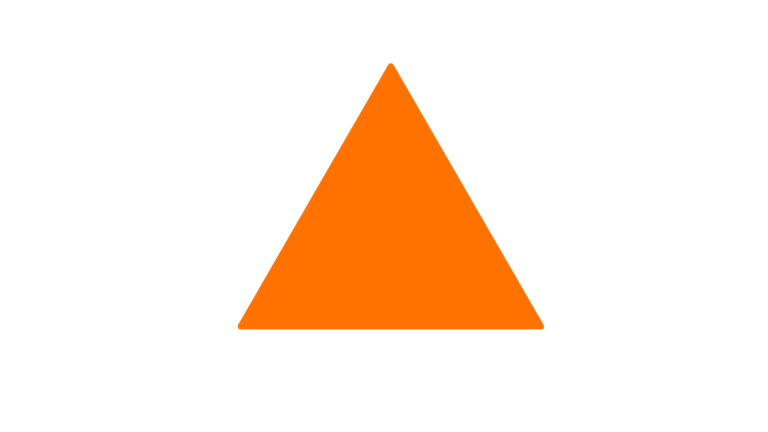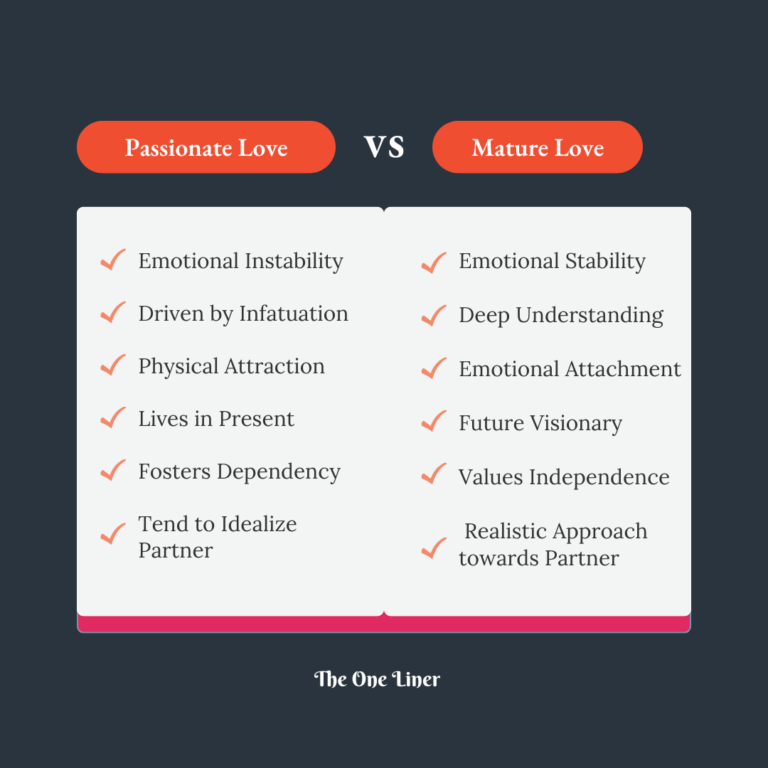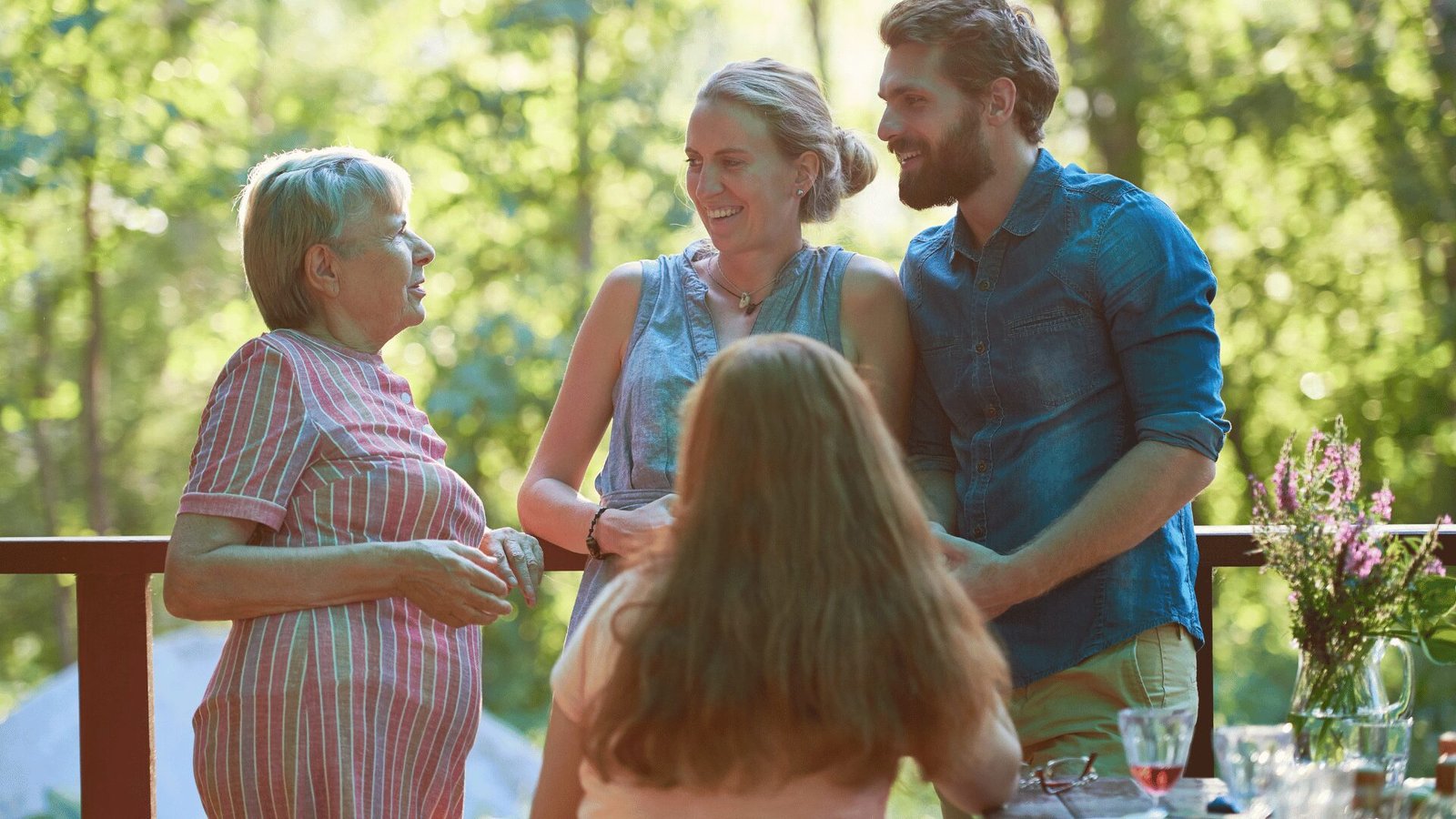The Evolution of Love: 8 Key Differences Between Passionate Love and Mature Love.
Shataghnee Chanda
October 22, 2024. 4 minute Read
Ah, love—an emotion so strong that molds us in its relationships, helps us shape our stories, and pulls us mercilessly through life’s ups and downs. Quite often, love denotes one thing or another: living, breathing, and ever-changing—thus, the evolution of love.
The earlier days’ passion and fire fades with time. But, the control of the fires doesn’t mean that the passion has ended, but it has calmed down to the eternal glow of mature love. Mature love will look different than its passionate counterpart, although it is beautiful and thrilling in its own way—each assuming its stage within the journey of emotional connection.
"
At The One Liner, we believe in celebrating every stage of love. This article will explore the evolution of love from passionate to mature and the philosophical, psychological, societal, and personal dynamics that accompany that change.
We’ll also go through the essential differences between passionate love and mature love that will help you understand the evolution of love rightly.
The Evolution of Love
True love, while dynamic in character, plunges into a very deep well-with fierce passion, excitement, and desire transforming into a more stable, although not less satisfying form of attachment. This change is not caused by the love as it has lost, but because love is opening up a deeper, fuller, richer, and more hopefully magnetic version of itself in the end.
This evolution can be analyzed into three enormous perspectives, including the philosophical, psychological, and societal and cultural aspects; and finally, the personal and interpersonal dynamics.
1. Philosophical and Psychological Aspects
In philosophical and psychological terms, love matures from the fiery sound of passion to the gentle calm of maturity. Passionate love typically starts from infatuation (the extremely romantic stage filled with emotional intensity, physical attraction, and the intensity of new romance). In this phase, expression of love is done with an open heart.
The mid-stage becomes characterized by the deeper emotions, emotional intelligence, empathy, and acceptance. In mature love, partners will begin to see each other, trying to embrace each other’s strengths and weaknesses with compassion. An element of selflessness enters the picture-let’s compromise and grow together.
Fact:
According to psychologist Robert Sternberg, love can be explained in his “Triangular Theory of Love” by three things: passion, intimacy, and commitment. Mature love focuses mainly on intimacy and commitment; passionate love is mainly passion.

2. Societal and Cultural Perspectives
You can’t find love in a vacuum; love is a product of society’s expectations and cultural norms. In many cultures, passionate love is adored and glamorized in films, books, and social media. The dramatic, sometimes absurd insanity of early love is celebrated, and the slow, steady drumbeat of mature love goes unsung in most cultures.
In many traditional cultures, principles of marriage are played on companionship for life; love transforms into a partnership of respect and support among equals. Here, love languages and the styles of communication play their part in how love is realized within the conflicts of the relationship.
Fact:
Research has shown that relationships characterized by mature love tend to enjoy greater satisfaction and better long-term prospects because they emphasize emotional connection and mutual growth over momentary thrills.
3. Personal and Interpersonal Dynamics
Love grows and evolves personally and interpersonally, often beginning with romance and passionate desire. At the start of a relationship, passionate love emerges out of physical attraction: intense emotional heights and a yearning to be validated. The thrill of newness found in the courtship of love is the thrill of passionate feeling.
In other words, with mature love, partners develop a high-quality capability for conflict resolution, compromise, and emotional support. Mature love is about building a life together where both feel safe and valuable. It is more of a secure and deeper kind of attachment since both have gone through trauma and have matured together.
Fact:
Studies have shown that couples in mature love experience a considerable reduction in issues and problems and are better able to weather life’s ups and downs.
Key Differences Between Passionate and Mature Love
As we have explored the evolution of love, let us dive into the 8 key differences between passionate and mature love.
1. Intensity vs. Stability
Passionate love is intense: the overwhelming need to be with one’s partner. The rush of emotions and electric company in every minute is overpowering. Still, this very intensity is difficult to enjoy over time; it instead obviously implies ups and downs of emotional wakefulness.
In mature love, it is stable. Less the rides of passion than the lower cast of stability. Whereas in passion, there is frequency, it becomes a constant pleasure and ease. A stability arrives which allows both the partner to feel safe and supported.


2. Infatuation vs. Deep Understanding
In the earlier phases of love, infatuation reduces our judgemental abilities. We are prone to creating ideal images of our partners to see their good qualities and forget their weaknesses. Passionate love takes root within this infatuation but sometimes gives rise to unrealistic expectations.
Stepping beyond infatuation, mature love allows for a deep understanding and acceptance of one’s partner. One sees the partner for what they are, with their own weaknesses and strengths; and one loves them for their personality, and not in spite of their flaws.
3. Physical Attraction vs Emotional Connection
Passionate love is so often founded on physical attraction and chemistry. A desire for physical closeness is indeed very strong. Sometimes that desire overshadows other important aspects of a relationship.
Mature love revolves around the emotional glue. While physical attraction remains significant, it is the emotional glue that provides sustainability. In mature love, partners place more importance on emotional intimacy and shared experiences than on physical attraction alone.
4. Excitement vs Commitment
Passionate love thrives on excitement-the thrill of new experiences, spontaneous adventures, and romantic gestures. With time, however, that excitement stains the subsequent step of the relationship-allure.
However, mature love carries with it a promise-a commitment to the integrity of the bond. In mature love, partners support each other’s development and growth. It means partners willingly opt to commit beyond that initial edge of excitement.

5. Present Oriented vs Future Visionary
Passionate love has, throughout, been about the present itself-the excitement of being with a partner and enjoying the new experiences it affords. Quite simply, it is all about being there and enjoying it right now.
In contrast, mature love is about the future. Partners in mature love have a common vision of where they want their relationship to go.
6. Dependence vs. Independence
In passionate love, dependency exists; therefore, either one of the partners or both depend on the relationship for completion. Dependency leads to unhealthy defense mechanisms.
Mature love brings independence. Its basic premise is that as such, both are secure in themselves and depend not on the relationship for their identity. They must support each other in growing as individual people, which ultimately does strengthen the relationship.
7. Emotional Highs and Lows vs. Emotional Balance
A characteristic nature of passionate love contains emotional highs and lows. Several moments of happiness are patched into one’s life, but on the other hand, there are also moments of doubt or fearfulness.
Balance, or steadiness of feeling, rather than emotional ups and downs is a primary characteristic in mature love. Not so many extremes of emotion are felt in this type of love experience; therefore, instead of emotional ups and downs, one finds greater steadiness of feeling – emotional equilibrium and contentment.
8. Idealism vs. Realism
Idealistic passion usually has idealism to it—in other words, believing the relationship to be perfect and that your partner is everything you could ever want. This can sometimes lead to a certain amount of disappointment when reality becomes apparent.
Mature love, on the other hand, leans very much towards realism. And partners do see things for what they really are, with all imperfections, and then accept it all as is. With this realistic approach comes greater satisfaction and happiness in the long run.
Final Thoughts
Accept the Beauty of the Evolution of Love!
Passionate love is characterized by growth, understanding, and deep emotional connection. Both types of love are good and necessary; however, true stability, commitment, and emotional fulfillment can only be offered by mature love. In The One Liner, we invite you to experience each stage of the evolution of love-from its exciting highs to the comforting depth of maturity.
Whether you’ve been together for months or decades, it’s useful to differentiate between passionate and mature love as a way of better navigating a relationship empathetically and emotionally. Take a little time to reflect on where your love stands today-and where it might go tomorrow.



